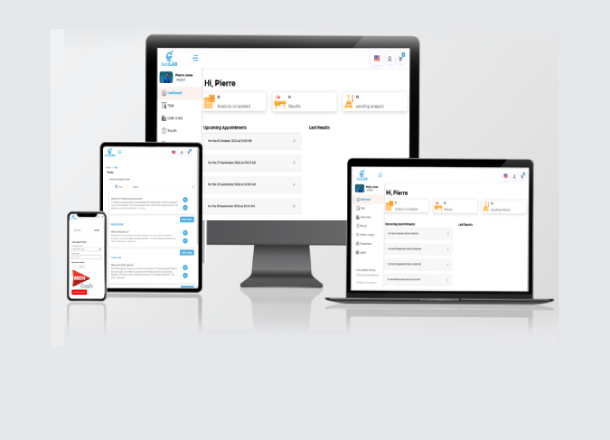The departments of Medlab.
At Medlab, our roots lie in providing essential medical testing that empowers patients and their physicians to better diagnose, understand and manage medical conditions. We have all the departments and services that a medical laboratory can have.
All the services we offer at Medlab
About Medlab
Since 1999 we have been trying to understand your needs and provide the right solutions, we provide all those we serve with respectful and compassionate care;
we reassure and empower people to make informed health decisions that can have a positive impact on their lives
Explore our other Services.
Contact Us
We would like to hear from you
FAQ
Frequently Asked Questions
It is necessary to come to the Laboratory for fasting when your prescription contains one or more of the following blood tests: Acetone, Uric Acid, Bile Acids, Fatty Acids, Calcium, Creatinine, Blood Glucose, Insulin, Triglycerides, Sedimentation Rate.
No, we take the samples during the opening hours of the Laboratory, ie 24 hours a day, 7 days a week. You can therefore come at your convenience by fasting if necessary.
All patient information is confidential and is protected by professional secrecy. The results can only be communicated to the patient himself, to a third party duly mandated by the patient, to the prescribing practitioner and to any other practitioner designated by the patient.
Yes, it is the external evaluation of quality: also known as quality control. It corresponds to the control, by an outside body, of the quality of the results provided by a laboratory. This retrospective control allows an inter-laboratory confrontation to improve the quality of the work of all participants. The external body sends the same samples to the various laboratories, collects the results obtained, in fact the study and transmits them with comments to the participating laboratories.
Yes, it is the internal quality control: all the procedures implemented in a laboratory in order to allow a control of the quality of the results of the analyzes as and when they are executed.
Reference values are results obtained for a given constituent in a reference population whose individuals are free from pathology or treatment likely to modify their values. Reference values may vary, depending on the geographical origin, sex and age of individuals. They are expressed generally taking into account the lower and upper limits determined by statistical study. They can be established by the biologist, according to the analytical techniques that he uses, or possibly verified when he uses the data of the scientific publications. The term “reference value” is preferable to “usual value” or “normal value”.
No. Validation represents the operation to ensure that a result has been obtained under satisfactory technical conditions and that it is compatible with the patient’s biological record. This validation is both analytical and biological. Analytical validation involves checking the compliance of the execution conditions with the procedures and taking into account the results obtained with the control samples. The biological validation is the control of the likelihood and the coherence of all the results of the analyzes of the same file, and their confrontation with the previous results. It may require knowledge of the clinical condition of the patient and the treatments used. It is provided by a biologist.






